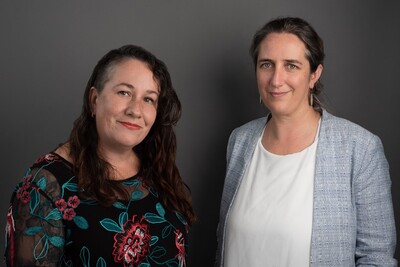Leading the way to better end-of-life care

April Creed and Rebecca Glover are passionate about doing things differently for Australia’s seniors — to do things better.
With a rich understanding of the aged-care and palliative care environment from their combined nursing experience of 45 years, the former nurses have facilitated the implementation of a more personal approach, with patient values at the core.
Recognising the limitations of impersonal advance care planning documentation — which often overwhelmed and poorly reflected the true values of the patients they were caring for — April and Rebecca worked to find a way to capture the essence of a person and use that to inform health and legal decisions. This led the pair to establish ExSitu.
Creating a solution
ExSitu is a digital tool that helps people to choose what they want for themselves as they continue to age and reach the end of their life. Questions and scenarios are presented online via a card-sorting process, with the responses translated into documents that can be used by providers to customise care and inform the medico-legal side of aged- and end-of-life care.
Those working in the end-of-life space are celebrating the tool.
An important focus for ExSitu is providing a roadmap that can align decision-making and help families feel confident that they are making the right decisions on behalf of their loved one. The process delves into what a person values most in life and then delivers that as a roadmap of decision-making.
“Before ExSitu, people were confronted by paper-based advanced care planning documents that left them feeling overwhelmed,” April said. “The language was impersonal and sterile, with multiple supporting documents to read, meaning that many people never completed the forms.
“We saw that care planning should not just be about a person’s medical needs, but should be informed by their values.”
“Those that require care can often lose their sense of identity, of who they are, so capturing what is important to someone enables care decisions to be made and allows for alignment between family members and healthcare providers too,” Rebecca added.
Human-centred design
ExSitu has been designed to be as easy to use as possible, to help people communicate what they value.
Rebecca explained that gaining an understanding of what a person values and enjoys can be translated into actions that improve quality of life. “For example, if someone has specified that they love creating art, this can be factored in when providers are deciding which services will provide the greatest benefit in the home-care setting. It’s a value-driven, holistic approach to care that considers physical and mental health and wellbeing.”
Aged-care providers can ask residents to complete the information via ExSitu online, prior to arriving at the facility. This enables better care planning and gives aged-care providers the information they need to best care for each resident, to improve the experience for that person.
“The idea is to give everyone a voice in the easiest way possible,” Rebecca said.
April and Rebecca have seen uptake increase as more aged-care providers hear about the benefits of the tool.
“Providers learn how easy it is to integrate ExSitu into their existing systems, realising it can be introduced to those needing care in a much easier way than other processes,” April said. “No extensive training is involved. It’s important that providers get to hear about it.”
Operating within the National Framework for Advance Care Directives, ExSitu is capable of having a far-reaching positive impact on senior Australians, care providers and their quality of care. April and Rebecca continue their work to improve advance care planning, working closely with GPs, lawyers and aged-care providers who appreciate the benefit of a tool that helps them operationalise their goal to provide values-based, person-led care in an easily integrated way.
Reducing medication harm: a two-year collaborative project
SAHMRI and University of South Australia researchers are collaborating on a two-year project to...
A Day in the Life of Amanda Bartosewicz
Despite encountering some very challenging circumstances and setbacks in her personal life,...
Should older people take driving lessons?
The latest research into older driver behaviour suggests that that tailored driving lessons can...




